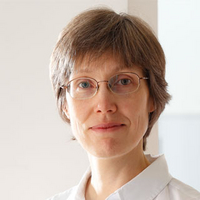Participating Groups
Roopesh Anand Petra Beli René Ketting Anton Khmelinskii Nard Kubben Katja Luck Christof Niehrs Jan Padeken Stamatis Papathanasiou Katharina Papsdorf Sandra Schick Helle Ulrich Siyao Wang Sina WittmannUbiquitin, SUMO and genome maintenance

Research in my lab centres on the contributions of two posttranslational protein modifiers, ubiquitin and SUMO, to the regulation of various cellular processes. We are particularly interested in DNA replication, repair and genome stability, focusing on a pathway of DNA damage bypass that allows genome replication in the presence of DNA-damaging agents. This pathway helps cells resist genotoxic agents, but also has the potential to cause genome instability and must be tightly regulated. In addition, we investigate the relevance of polyubiquitin chains and their geometries to ubiquitin signalling in other contexts.
The lab uses a combination of genetic, genomic, molecular biological and biochemical approaches to elucidate how the ubiquitylation or sumoylation of key replication factors regulates the replication of damaged DNA and how damage bypass is coordinated with the overall cellular DNA damage response. We have developed next generation sequencing methods for the genome-wide mapping of DNA lesions and replication intermediates. In addition, we are designing experimental tools to detect, manipulate or inhibit ubiquitylation or sumoylation reactions within yeast and mammalian cells.
Positions held
- 2018 - 2019: Executive Director, Institute of Molecular Biology (IMB), Mainz
- Since 2013: Scientific Director, Institute of Molecular Biology (IMB), Mainz; Professor, Faculty of Biology, Johannes Gutenberg University (JGU), Mainz
- 2004 - 2012: Group Leader, Cancer Research UK London Research Institute, Clare Hall Laboratories
- 2000 - 2004: Group Leader, Max Planck Institute for Terrestrial Microbiology, Marburg
- 1998 - 2000: Postdoc, Max Planck Institute for Biochemistry, Martinsried
- 1997 - 1998: Postdoc, University of Heidelberg
Education
- 2004: Habilitation, Faculty of Biology (Genetics), Philipps University Marburg
- 1996: PhD in Chemistry, University of California, Berkeley
- 1992: Diploma in Biology, Georg-August-University Göttingen
Selected publications by Helle Ulrich
Shi J, Hauschulte K, Mikicic I, Maharjan S, Arz V, Strauch T, Heidelberger JB, Schaefer JV, Dreier B, Plückthun A, Beli P, Ulrich HD# and Wollscheid HP# (2023) Nuclear myosin VI maintains replication fork stability. Nat Commun, 14:3787 (#indicates joint correspondence) Link
Yakoub G, Choi YS, Wong RP, Strauch T, Ann KJ, Cohen RE and Ulrich HD (2023) Avidity-based biosensors for ubiquitylated PCNA reveal choreography of DNA damage bypass. Sci Adv, 9:eadf3041 Link
Wegmann S*, Meister C*, Renz C, Yakoub G, Wollscheid HP, Takahashi DT, Mikicic I, Beli P and Ulrich HD (2022) Linkage reprogramming by tailor-made E3s reveals polyubiquitin chain requirements in DNA-damage bypass. Mol Cell, 82:1589–1602.e5 (*indicates joint contribution) Link
Sriramachandran AM, Petrosino G, Méndez-Lago M, Schäfer AJ, Batista-Nascimento LS, Zilio N# and Ulrich HD# (2020) Genome-wide nucleotide-resolution mapping of DNA replication patterns, single-strand breaks, and lesions by GLOE-Seq. Mol Cell, 78:975-985.e7 (#indicates joint correspondence) Link
Wong RP, García-Rodríguez N, Zilio N, Hanulová M and Ulrich HD (2020) Processing of DNA polymerase-blocking lesions during genome replication Is spatially and temporally segregated from replication forks. Mol Cell, 77:3–16.e4 Link
García‐Rodríguez N, Morawska M, Wong RP, Daigaku Y and Ulrich HD (2018) Spatial separation between replisome‐ and template‐induced replication stress signaling. EMBO J, 37:e98369 Link